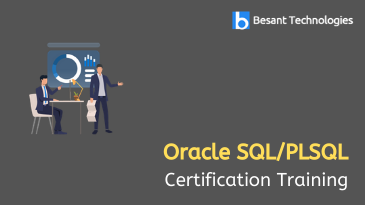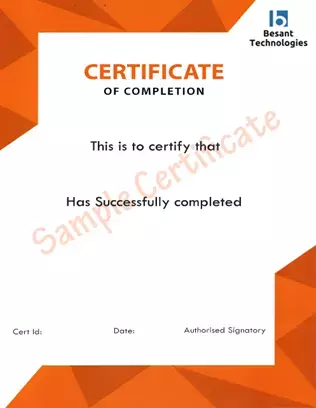 1965 Ratings (5.0)
1965 Ratings (5.0)

Have Queries? Ask our Experts
Oracle uses a PL/SQL engine to process the PL/SQL statements. A PL/SQL programming language can be stored in the client system or in the database. It automatically inherits the robustness, security, and portability of the Oracle database.
Our Oracle PL/SQL Training in Bangalore will provide you a great understanding of PL/SQL along with the benefit of Oracle Database technology and other advanced relational database concepts. Course content for Oracle PL/SQL training with Besant Technologies is carefully designed to match the industry requirements. We begin our course with basic concepts of Oracle such as how to retrieve data. Then we stoutly progress through more advanced topics such as PL/SQL structure, error checking, exception handling, PL/SQL tables, stored procedures, functions and bulking in PL/SQL. We will provide continuous support for your career and you should be on your way to become adept in Oracle PL/SQL. You will get all the information about Oracle into the training which covers entire topics from the basic beginner level to the expert level. Our main aim is to provide all the relative information to the student of different background with which they can easily understand and can get a real-time training experience. Your quest for the right Oracle SQL/PLSQL Training in Bangalore ends here.
Oracle PL/SQL is an advanced transaction processing language that can be executed on variegated operating systems and on minimalistic configuration. It can also be customized to process convoluted business logic and rules for the desired result. This Oracle SQL/PLSQL Training in Bangalore gives you the desired technology and programming skills on how to astutely work on complex and challenging industry requirements. You can apply for top jobs upon the completion of this training. You will get the opportunities to explore the concepts of relational database along with the benefit of the programming language used in Oracle database technology. We provide regular demonstrations and hands-on practice which flourish the fundamental concepts that will make you highly competent. By enrolling in Oracle SQL/PLSQL Training in Bangalore with us, you’ll begin using Oracle SQL Developer to develop several program units.
Oracle is an uncontested leader in the database industry. The enormous increase in data accumulation in the IT sector and other industries has made PL/SQL technology an all-time high in-demand, which ultimately excels the career growth in the IT industry. With an Oracle PL/SQL certification from Besant Technologies, an aspirant post the completion of the course can meet the challenges of the job, head-on; we provide the best Oracle SQL /PLSQL Training in Bangalore with 100% placement assistance.
Get upto 30%* Discount in all courses. Limited Offer. T&c Apply.
Register now
Use XML for SQL and PL/SQL Developers
Take the first step in your learning journey. Get hands-on experience and be a master. Buy 3 course @24,999/-
Learn moreBesant Technologies provides flexible timings to all our students. Here are the Oracle PL/SQL Training Classes in Bangalore Schedule in our branches. If this schedule doesn’t match please let us know. We will try to arrange appropriate timings based on your flexible timings.
Educate employee's in form of learning programs means in turn the success of your business/organization.
Tune upOur Trainers provide complete freedom to the students, to explore the subject and learn based on real-time examples. Our trainers help the candidates in completing their projects and even prepare them for interview questions and answers. Candidates are free to ask any questions at any time.
400+ Students getting placed every month from startup to top level MNC's with decent package after doing course.
Placement record Get your jobBesant Technologies Certification is Accredited by all major Global Companies around the world. We provide after completion of the theoretical and practical sessions to fresher’s as well as corporate trainees.
Our certification at Besant Technologies is accredited worldwide. It increases the value of your resume and you can attain leading job posts with the help of this certification in leading MNC’s of the world. The certification is only provided after successful completion of our training and practical based projects.

Join in a group of three or more on same course we will be delighted to offer you a group discount.
Get DiscountJoin the course, Get your resume modified from experts. Our students are being hired at the leading companies.
Let's goI would like to highlight a few points about my association with Besant Technologies. The faculty members out here are super supportive. They make you understand a concept till they are convinced you have gotten a good grip over it. The second upside is definitely the amount of friendliness in their approach. I and my fellow mates always felt welcome whenever we had doubts. Thirdly, Besant offers extra support to students with a weaker understanding of the field of IT.
s
When I joined Besant Technologies, I didn’t really expect a lot from it, to be extremely honest. But as time went by, I realised I got from Besant Technologies exactly what I wanted- a healthy environment for learning. Cordial teachers and their valuable lectures make understanding things so much easy. I thank Besant for having been so supportive throughout the course.
D
Besant Technologies offers 250+ IT training courses in more than 20+ branches all over India with 10+ years of Experienced Expert level Trainers.
Fully hands-on training | 30+ hours course duration | Industry expert faculties | Completed 1500+ batches | 100% job oriented training | Certification guidance | Own course materials | Interview preparation | Affordable fees structure
Besant Technologies is the Legend in offering placement to the students. Please visit our Placed Students List on our website.
More than 2000+ students placed in last year.
We have a dedicated placement portal which caters to the needs of the students during placements.
Besant Technologies conducts development sessions including mock interviews, presentation skills to prepare students to face a challenging interview situation with ease.
92% percent placement record
Our trainers are more than 10+ years of experience in course relavent technologies.
Trainers are expert level and fully up-to-date in the subjects they teach because they continue to spend time working on real-world industry applications.
Trainers have experienced on multiple real-time projects in their industries.
Are working professionals working in multinational companies such as CTS, TCS, HCL Technologies, ZOHO, Birlasoft, IBM, Microsoft, HP, Scope, Philips Technologies, etc
Trained more than 2000+ students in a year.
Strong theoretical & practical knowledge.
Are certified professionals with high grade.
Are well connected with hiring HRs in multinational companies.
No worries. Besant technologies assure that no one misses single lectures topics. We will reschedule the classes as per your convenience within the stipulated course duration with all such possibilities. If required you can even attend that topic with any other batches.
Besant Technologies provides many suitable modes of training to the students like
Classroom training | One to One training | Live Instructor LED Online training | Customized training
You will receive Besant Technologies globally recognized course completion certification.
Yes, Besant Technologies provides group discounts for its training programs. To get more details, visit our website and contact our support team via Call, Email, Live Chat option or drop a Quick Enquiry. Depending on the group size, we offer discounts as per the terms and conditions.
We accept all major kinds of payment options. Cash, Card (Master, Visa, and Maestro, etc), Net Banking and etc.
Please Contact our course advisor +91-8767 260 270. Or you can share your queries through info@besanttechnologies.com
Enroll for Classroom, Online, Corporate training.
No 2, Ground floor, 29th Main Road,
Kuvempu Nagar, BTM Layout 2nd Stage,
Bengaluru, Karnataka-560 076
No. 43/2, 2nd Floor, VMR Arcade, Silver Springs Layout,
Munnekollal Varthur Main Road, Marathahalli,
Bengaluru, Karnataka-560 037
No. 179/y, 2nd & 3rd Floor, 12th Main Road
3rd Block Bashyam Circle
Bengaluru, Karnataka-560 010, India
No.229/16, 9th Main Road, 3rd Block,
Jayanagar, Bengaluru, Karnataka-560 041
No.513, CMR Main Rd, HRBR Layout 2nd Block,
HRBR Layout, Kalyan Nagar,
Bengaluru, Karnataka-560 043
Ganga Enclave, No. 7, 3rd Floor, Village,
Doddathoguru,
Neeladri Rd, Karuna Nagar, Electronics City Phase 1,
Electronic City,
Bengaluru, Karnataka-560 100
First Floor, No.54, 5th Main Road,
HAL Old Airport Rd,
Behind Hotel Leela Palace,
HAL 2nd Stage, Kodihalli,
Bengaluru, Karnataka-560008
Plot No. 2799 & 2800, 1st Floor, 27th Main Rd,
1st Sector, HSR Layout,
Bengaluru, Karnataka-560 102
No. 2757/2760 & 2759, 1st Floor,
Kodigehalli Ward No.8, Sahakar Nagar,
Bengaluru, Karnataka-560 092
